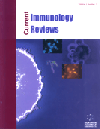-
s Ontogenic Development and Population Dynamics of Hepatic Dendritic Cells
- Source: Current Immunology Reviews (Discontinued), Volume 8, Issue 1, Feb 2012, p. 3 - 11
-
- 01 Feb 2012
Abstract
Dendritic cells (DCs) are rare, bone marrow-derived antigen-presenting cells (APCs) characterized by a unique capacity to stimulate naïve T cells and initiate primary immune responses. The special immunological microenvironment in the liver is associated with the induction of tolerance to dietary food antigens, and yet, it maintains the capacity to sustain effective responses against pathogens. Recent studies have provided data to elucidate the critical roles that DCs play in the induction of central and peripheral immunological tolerance, in regulating the types of T cell immune responses, and functioning as sentinels in innate immunity against microbes in the liver. The diverse functions of hepatic DCs in immune regulation depend on the heterogeneity of DC subsets and their functional plasticity. Here, we review recent progress in our understanding of the ontogenic development, the population dynamics, and the functional plasticity of DCs in the liver.


